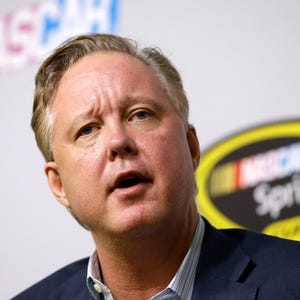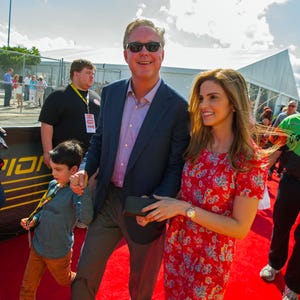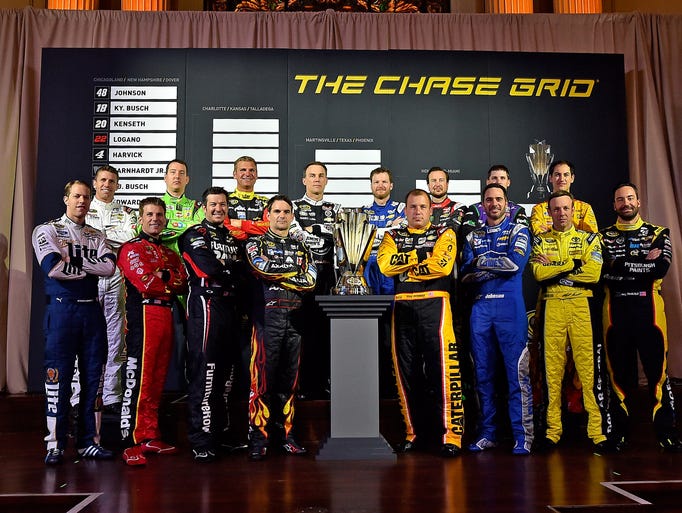Brian France blazes ahead in continuing bid to evolve NASCAR – USA TODAY
HOMESTEAD, Fla. — Brian France was digesting a hurried lunch and morsels from a just-concluded media forum as a helicopter was prepped to whisk him from Homestead-Miami Speedway. At the other helipad was a business meeting with family members that could alter the sport his clan had overseen since 1948.
Another day in changing NASCAR’s future.
The 53-year-old series chairman and third-generation caretaker of a sanctioning body formalized by his late grandfather, “Big” Bill, and forged into a major league by his late father, Bill Jr., Brian Zachary France has, in 12 years in charge, overseen some of the most transformative, modernizing times in the history of a sport created by rapscallions and rascals hauling illegal liquor. For that, he is at once celebrated and chided, perspective pending, but from all angles scrutinized.
Fans seems to flitter between the notion that he is utterly ruining his family business that they happen to love, or maybe that he’s just tarnishing it some. Drivers have complained about modifications to the way they compete for the sake of keeping the sport relevant in a landscape that seems generally less interested in motor sports. But they, like team owners must concede to his successes, such as procuring a monstrous $4.4 billion, 10-year television package from NBC Sports in an era when grandstands reflect sunlight in the absence of ticket-buyers and ratings have trended at times in recent years from morose to terrifying for the industry.
Whereas NASCAR under his predecessors was a fondly remembered benevolent dictatorship in simpler times, France’s is one of layers and complexity. Delegation and direction. Less romance, more data. Tradition and relevance.
“It’s the easiest thing to do and the hardest thing to do all at once because it’s not hard to understand how you have to progress in certain areas to make racing better, closer more important in an already crowded landscape,” France told USA TODAY Sports in a wide-ranging, 30-minute interview. “That’s not overly complicated. What’s complicated is, when you do it to their sport.
“If race fans don’t like it, imagine team owners or drivers who are going to be affected by a format or a big change we’re going to make in the rules. Big change, they’re going to have huge reactions until it smooths out. And so managing all that, and taking that incoming shrapnel that you’re going to have, if you’re a guy like me, is hard, because you know it’s coming. But you also know you have to cross to the other side and you have to do these things to make our sport as popular and deliver on the promise on close safe racing as you possibly can. That’s the balance.”
Leaning forward in his chair in a boardroom overlooking vast parking lots and tree farms, France seems stimulated by the prospect of finding that balance. He has more ideas. Some will be popular. Some will not.
“It’s understandable because we are making structural changes in the sport,” he added, “and I get that that is unsettling even for people who think I can do no wrong, those 10 people out there that think that.”
In a lengthy media session two days before the Chase for the Sprint Cup finale, in which he fielded numerous questions about the state of the sport, the line between entertainment and competition in the wake of Matt Kenseth’s two race-suspension for intentionally wrecking Joey Logano — in essence, out of championship contention in an act of retaliation at Martinsville Speedway — a chairman often criticized for a perceived disconnection with the daily pulse of the sport seemed very much engaged. Invigorated, even, in how he doubled down on several key themes in his defense of the new Chase system that has stoked competition and aggression the past two seasons. Feisty, even, in how he reiterated his use of the word “quintessential” in describing Logano’s move to dislodge Kenseth from the lead late at Kansas Speedway — which flipped the first domino in the feud with the veteran — even after the word had been hash-tagged and brandished in derision by those either sympathetic to Kenseth or decrying a broader problem with series leadership.
No, France seemed very engaged, indeed. And with more initiatives afoot — including what would be a major shift in the series business model with a possible new chartering system for ownership — he doesn’t seem like he is or wants to go anywhere.
“I think I’m having more fun than I’ve had in a long time, even though it’s hard and so on,” France said. “But we’re making a lot of progress on things and I’m able to get a lot of things through a complicated business industry. And that’s rewarding.”
PHOTOS: Family ties in NASCAR
Staying engaged in his own way
Though France has presided over a revolutionary period in terms of the way NASCAR is not only contested, but consumed, he isn’t voracious in his social media habits. France and his wife, Amy, share a Twitter account bearing some personal family moments, but the feed has been fallow since 2014. He emails and he texts his lieutenants — the volume and frequency depending on the storyline or business of the moment — but he prefers personal conversations. Though NASCAR in 2013 unveiled a Fan & Media Engagement Center to measure the tone of the sport’s social media interaction on Twitter, France generally, he said, only sees the “hot ones” as forwarded by his communications department in the form of emails.
“He’s not the day-to-day operations guy his dad (was),” NASCAR chief operating officer Brent Dewar told USA TODAY Sports. “That’s what I do. … We talk every day from one to five times. It’s always in short bursts and there are thoughts. He’s looking at the next 20 years. He’s looking for the trends. Some people will say he can see around the corners, but that’s his job and he’s very good at it.”
And sometimes France is compelled to engage as Brian from New York on the hotline. Though he generally conducts few open media sessions per season — he has done just two so far this year — he has become a semi-frequent surprise guest on SiriusXM radio when compelled to correct perceived misconceptions. Host Dave Moody told USA TODAY Sports he generally has less than “10-15 minutes notice” of a France call.
The impromptu interviews are exasperating to NASCAR communications staff and senior leadership, who begin firing out text alerts when it becomes apparent that the chairman is going live. Then they begin texting France as he’s on air. France is aware of their feelings. He calls anyway.
All the while, France said, he attempts to apply the principals of his unabashed fan crush on the Duke men’s basketball team when explaining how his decisions have impacted inherently selfish fans.
“If it’s a teaching moment and I think we’re not as a group conveying what I think we need to, sometimes I’ll do that,” he said. “And then I have to remember that if they’re fans of a certain driver, they’re not going to hear the point of the day, they’re going to hear what they want to hear because they’re like me. I don’t want to hear anything (bad) about the Blue Devils at all. Don’t tell me anything. I don’t want to hear it. So I have to balance that.”
Taking the reigns
France was “perfectly content,” he said, in his pre-chairman role as NASCAR vice president of marketing and corporate communications. Having left the University of Central Florida credits short of a journalism degree, he eventually proved himself to a demanding father beginning in 1989 by running a leased short track in Tucson, Ariz., for three years. He returned home to Daytona Beach, Fla., to an ever-expanding role in the family business, helping open new offices in New York and Los Angeles and was named chairman in October 2003 as his father’s health failed. France oversaw the signing of a $4.8 billion television package, the replacement of a tobacco company as title sponsor for the top touring series with a cellular carrier and enacted the initial version of the Chase. Long-time family friend and team owner Felix Sabates said at France Jr.’s funeral in 2007 that he was elated the former chairman maintained faith in the son who would become the sport’s next leader.
“I’ve been around his family a long time, and when Brian was a young man, Brian was Brian and a lot of people would have given up on him, and Bill never did,” Sabates, a France Jr., pallbearer, said. “I told Brian, ‘When they shipped you to Arizona, I thought they would keep pushing you down until you went to Mexico and they never saw you again.’ But Bill had a plan with Brian.”
Brian France concedes that he was “not as ready as I am now” for the responsibility. But he assumed it.
“I don’t know. I was probably pretty ready just because I’d grown up on it and understood and worked in all facets of it,” France said of assuming control. “It just wasn’t something I was frankly clamoring to do. I’m honored to do it, humbled to be able to do it, but I didn’t seek it out.”
NASCAR stakeholders seem pleased with his tenure in a macro sense, even if they have at times disagreed with the micro.
“He can see things that the rest of us don’t see and he has a vision to change things for the better,” team owner Rick Hendrick told USA TODAY Sports. “I think he has just matured in the job and you learn from things that work and things that don’t work. But he’s always been very innovative and very smart, great marketer, and I think that’s been the key in kind of having a sense of what the fans want and what works, for our customers, our fans.”
The ‘change agent’
Dewar has worked with and for France in 15 years in the automotive industry, as a former senior vice president of global Chevrolet and, beginning in 2013, as one of his hands on the mechanisms of daily business.
“He likes to say we’re going north but he doesn’t micromanage that north means we turn left, we turn right,” Dewar said.
France delegates and participates when needed and engenders in his employees a sense of pace. Tardiness is a peeve — not as reviled as the mention of a “good points race,” but up there — and objectives he shares are to acted upon quickly.
“Brian, as an outsider, what I saw was the change agent,” Dewar said.
Dewar learned that in 2007, when after automakers informed France they were “just getting clobbered on CAFÉ (Corporate Average Fuel Economy) and we were racing leaded gas and two miles per gallon type-thing” the series enacted a green initiative within three months. Dewar saw the change agent internally two years ago in the enactment of a major overhaul to the Chase format, in which three elimination rounds culminated in a one-off championship among four title-eligibles. France and series vice chairman Mike Helton had initially resisted the idea, with France refusing to allow it to come to a discussion because he considered it “too extreme for auto racing.”
“I had not let it get to a point where we could have a full discussion and debate about it,” France said, “because I just generally thought it was too much, that we hadn’t fully digested what we had done. Remember, in auto racing, the original Chase format was extraordinary. I don’t think I’ve ever taken more shots than I have taken in that time we announced that, even though it worked out great and it was the right thing to do. It was drivers, teams, it was so different from what had been done in auto racing … so I was a little apprehensive too, this was going to be another of those things, but it worked out great.”
Convinced, France championed the new Chase concept as it was adopted beginning in 2014.
France espouses a greater utilization of technology as the next logical leap — “how we could we use more science than art to come up with the perfect rules package that creates perfect competition” — but the most impactful change of his term could be very much rooted in people. Namely the ones who provide the show.
Part of that initiative may well have been at the end of his helicopter ride from Homestead, where he met sister Lesa France Kennedy, CEO of International Speedway Corp., and uncle Jim France, a NASCAR and ISC executive, to discuss a proposal designed to create material equity for ownership through assurance of race entry and, Brian France believes, greater competition among current and potential new teams. For a sport raised from a regional passion to a major league on the labor of drivers and owners under the independent contractor relationship, such a change would be seismic.
“I don’t think revolution is the right word. Maybe more evolution,” Rob Kauffman, part-owner of Chip Ganassi Racing and president of the Race Team Alliance – formed in summer 2014 with 18 owners, told USA TODAY Sports. “What it tries to address is improving the structure of the sport. It doesn’t dramatically change the economics for the teams, but I think it puts the structure on a more stable footing so we can focus on growing as opposed to just surviving.
“I think Brian has been a strong supporter. Without his backing the project would not have gotten off the ground.”
And it is possible, according to France, lead NASCAR negotiator Dewar and Kauffman, that it could be in place for 2016.
“(Owners) are one of our most important stakeholders and so we need to figure out how to make the owners’ business model more attractive and better for them,” France said. “And when we do that and if we can do that, we will have made racing, here again, back to the central criteria, will have made racing better because we will have more stability in ownership; we’ll have new owners potentially if we do all this correctly.”
It would be the next big grab for a chairman whose tenure has been full of them, popular initially, eventually or never. That won’t dissuade him from asking his executives for more. With change there is risk.
“I think (I am) somebody that got all the things they needed to run the sport right, made decisions,” he said. “Not perfectly, no one is going to do that but, you know, I think history will show that. I don’t worry about that, but we have to make a lot of decisions that affect a lot of people.
“We took chances. I’m a big believer in that. No big mistakes, I tell our guys, we’re going to make mistakes. I expect no big mistakes. But let’s make some because this takes risk. … So we will do things our peer group probably wouldn’t have done, maybe. And we’re good with all that.”
Follow James on Twitter @brantjames
PHOTOS: Highlights from the 2015 Chase for the Sprint Cup










